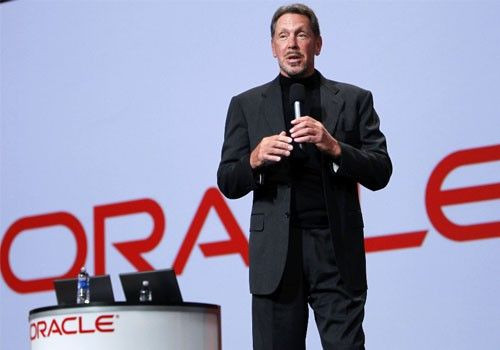Oracle’s Terrible Day: Loses $17 Billion in Value as Ellison’s Stake Dips $3.9 Billion

Investors in Oracle, the No. 1 enterprise software vendor, had their worst day in three years as shares closed down nearly 12 percent, chopping $17 billion from the company's market value.
Shares closed at $25.73, down $3.44, or 11.8 percent after being down to $24.91 or 15 percent at midday. The plunge came after the company missed second-quarter estimates for earnings.
Larry Ellison, 67, founding chairman of the Redwood Shores, Calif.-based Oracle took a personal hit, losing $3.88 billion in one session. At one point Wednesday, his personal loss exceeded $5.3 billion.
Ellison owns 1.13 billion shares of the company he founded as Oracle Systems in 1977. That's the equivalent of 22.4 percent of the outstanding shares, according to the proxy for Oracle's Oct. 11, 2001 annual meeting.
It's that huge stake - unusual in a public technology company - that has given Ellison almost iconic power to direct the company, hire and fire subordinates and plan acquisitions. On an investor call Tuesday, he expressed confidence the company will withstand an apparent order slowdown and execute a new strategy that relies more on sales of servers and software than before.
Last year, Oracle acquired workstation pioneer and Java developer Sun Microsystems for $7.4 billion. Now, to better compete with IBM, Hewlett-Packard, Cisco Systems and others to handle masses of data for the cloud, Oracle is shipping Sun servers loaded with Oracle database and analytical software.
Wednesday's plunge began after Oracle reported second-quarter earnings of 54 cents a share, 2 cents below the estimate carried by according to by ThomsonReuters. The estimates generally followed company guidance.
Oracle's second-quarter revenue was $8.8 billion, up 2 percent but below the expected to range between $8.92 billion and $9.27 billion. In the first quarter, the company earned 46 cents a share on revenue of $8.4 billion, nearly 11 percent above the 2010 figure.
Co-president Safra Catz blamed reluctance of customers to close deals late into November, when Oracle's quarter ended. She also issued a lackluster forecast for the current quarter, about level earnings as well as revenue.
This quarter was not as we thought it would be, she told investors Tuesday night. Oracle shares, which had closed at $29.17, fell nearly 9 percent, after the results were announced.
On a net basis, Oracle said second-quarter net income rose 17 percent to $2.19 billion, or 43 cents a diluted share.
The Oracle miss also led to a rout in other technology stocks including its rivals in enterprise software and databases. Hewlett-Packard shares fell nearly 2 percent, IBM shares were off 3 percent and ADRs of German arch-rival SAP plunged more than 6 percent.
Overall, U.S. markets ended up after falling earlier. The S&P 500 closed at 1,243.72, up 2.42.
Analysts trimmed forecasts for Oracle's second half of fiscal 2012. Jefferies' Ross MacMillan maintained his buy rating and kept his third-quarter earnings estimate at 57 cents a share, as suggested by Catz, but saw gains to 78 cents in the fourth quarter. His price target for Oracle is $36.
Cannacord Genuity's Richard Davis downgraded Oracle shares from buy to hold because it will have to rebuild confidence and slashed his price target to $28 from $38.
Other firms that downgraded Oracle shares Wednesday included Societe Generale and Credit Agricole; UBS maintained the shares as a 'buy.
Oracle's gross margins fell to 64.6 percent from 67.7 percent a year ago, although the company said operating margins were satisfactory at 45 percent.
Oracle also said its cash and investments rose to $31 billion, from about $28 billion in the first quarter. The company acquired Endeca Software for a reported $900 million in the quarter and announced a bid for RightNow Technologies of Bozeman, Mt., for about $1.5 billion.
© Copyright IBTimes 2025. All rights reserved.






















